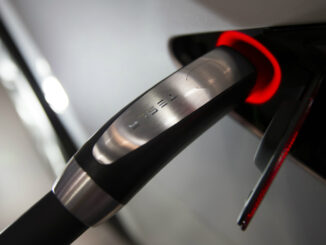
A 128-year-old Cleveland-area industrial equipment manufacturer is among the newest makers of fast chargers for the growing electric vehicle market.
Lincoln Electric’s new Velion DC fast charger adapts and adds to technology the company has used for its welding machines and other heavy-duty power equipment.
The innovation is an example of how more U.S. manufacturers outside of the energy sector are beginning to find sometimes unexpected opportunities to participate in the country’s growing clean energy economy.
It all started almost two years ago when a group of senior engineers walked into president and CEO Chris Mapes’ office and explained the similarities between direct-current electric vehicle chargers and the plasma and electronics equipment the company has long manufactured, adding: “We think we can make these.”
“If you were to open up a welding machine or a plasma cutting machine, you would see power electronics,” Mapes explained, following a ribbon-cutting ceremony in Euclid, Ohio, last week for the company’s new fast charger product. Software engineering works with printed circuit boards to manage power, similar to what happens in a DC fast charger.
The company already has its own printed circuit board manufacturing facility. The innovation challenge was developing software to let a charger interface with any electric vehicle. When people plug in a vehicle, it and the charger go through a series of electronic messages and “handshakes.” Those share information about the car and the charger, as well as details about how much electricity is needed, signals and feedback for a precharge test, and then the actual charge.
Reliability has been a challenge for electric vehicle charging. Drivers can plan trips to stop at charging stations along the way, but out-of-order chargers can cause frustration and derail trips. That all adds to range anxiety.
Steve Sumner, vice president for corporate innovation, said some other EV chargers “were born out of designs and manufacturing strategies that were more appropriate for lab-grade equipment — something that would see its whole life inside in perfect conditions.” In the real world, rain, snow, cold temperatures, hot temperatures, wind, dust and other factors can mess with electronics.
“What Lincoln Electric’s really known for, besides being a very good power conversion company, is making devices that last and live their whole lives outside,” Sumner said, noting that the company’s industrial products have been used on ships, in deserts and even in Antarctica. Likewise, the new charger is “purpose-built for ruggedness in the field.”
One reason for that reliability is that the company coats its printed circuit boards with a clear plastic epoxy. Two circuit boards go together in a metal casing to make 50-kilowatt modules.
Three of those modules make up the heart of the charger’s power tower, which typically sits behind a fence near a grid connection. The relatively few electrical connections between the modules and other parts of the equipment also provide protection from the elements.
“Because it’s so ‘simple’ and clean in design, and well protected, that’s where we believe the inherent reliability comes from,” Sumner said.
As an established company that began in the United States, Lincoln Electric was already compliant with Federal Highway Administration’s Buy America standards, levy standards and other regulatory programs, said Sheila Cockburn, who works with the U.S. Department of Transportation’s Joint Office of Energy and Transportation that advises on those standards.
“They’re leveraging their current technology to enter a newer market,” Cockburn said. “And they’ve been smart in being able to see the vision of where things are going and being able to pivot to use what they have to supply the new market.”
The move is an example of how companies can play a role in the clean energy economy, even if they aren’t currently part of the energy sector, said Rick Stockburger, president and CEO of BRITE Energy Innovators, based in Warren, Ohio. The organization acts as a hub to provide business and technical expertise to entrepreneurs looking to serve the energy sector.
“It’s exactly the type of leadership we need to see from all of our legacy manufacturers in developing new products,” Stockburger said.
The Bipartisan Infrastructure Act, the Inflation Reduction Act, and other recent federal policies and funding programs can help private manufacturers make that transition.
“If you look at what came down in legislation from the past three years, we’re not leaving behind American manufacturing like we did with the solar tax credits in the Obama administration,” Stockburger said. “We put American-made caveats in all of these bills.” And he looks forward to seeing what comes next from other companies.
“The one thing I’ll never underestimate is the power of American innovation,” Stockburger said. “There are just really, really smart people that look at opportunity and frankly are interested in seizing it.”


